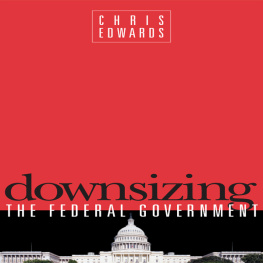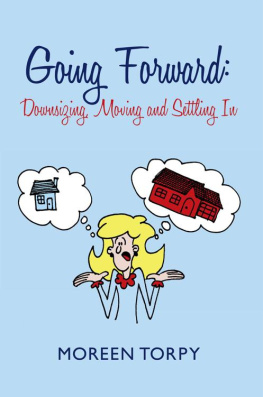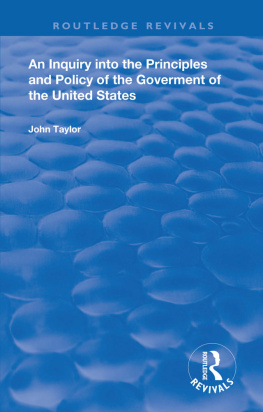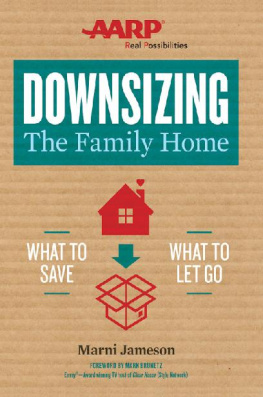1. Introduction
The federal government is running large budget deficits, spending too much, and heading toward a financial crisis. Federal spending increased by one-third in President George W. Bushs first four years, with large increases for agriculture, defense, education, health care, and other areas.1 Those increases have come just as the costs of federal entitlement programs are set to balloon when the baby-boom generation retires. Spending on the three main entitlement programsSocial Security, Medicare, and Medicaidis expected to double from $1 trillion in 2005 to $2 trillion by 2015.2
Where will the money come from? If government spending is not cut, average working families will face huge tax increases that dwarf anything seen in decades. Tax increases would damage the economy and be strongly resisted by the public. As a consequence, policymakers need to begin identifying programs in the federal budget that can be cut, transferred to the states, or privatized.
This book provides policymakers and the public with a detailed guide to federal budget reforms. It proposes eliminating more than 100 agencies and programs to reduce federal spending from 20 to 15 percent of the nations economy. The country would be better off if the $2.5 trillion federal government were downsized. Cutting the budget would avert the looming federal financial crisis and give Americans a stronger economy and a freer society.
The Temptation to Tax
I came to Washington in 1990 to study economics and learn how the federal government works. My first lesson in government came from watching President George H. W. Bush reverse his famous read my lips: no new taxes pledge from the 1988 election campaign. Bush increased federal spending 16 percent in his first two years in office and by 1990 was faced with a slowing economy and a rising deficit.3 Deficits can be reduced by cutting spending, but the president and his budget adviser, Richard Darman, did not look very hard for programs to cut.4 At the same time, numerous Republicans were telling Darman privately that taxes should be raised.5
What to do? Darman suggested that the administration hold a budget summit with the Democrat-controlled Congress. With a summit, the blame for a tax hike could be shared with the other party. The result was the 1990 budget deal, which was a victory for bipartisanship but a loss for American taxpayers.
That pattern has been repeated many times.6 Federal overspending, high deficits, perhaps a recession, and prestoan excuse for a tax hike. Usually, tax increases are coupled with promises of spending cuts. But such cuts are usually just reductions in future spending growth, and even those often fail to materialize. With the 1990 budget deal, the Bush administration claimed that there would be two and a half dollars of spending cuts for each dollar of tax increases.7 But the cuts to defense were against an inflated baseline, and there were no cuts to nondefense spending.8 Indeed, nondefense spending increased 15 percent in the two years following the budget summit.9
Large budget deficits are likely to be an ongoing part of the fiscal landscape. That could mean damaging budget summits and tax increases in the future unless policymakers start making real spending cuts. George W. Bush has so far broken the pattern of the three previous presidents and resisted tax increases. But he has driven up spending and the deficit just a few years before growing numbers of the elderly will be demanding their promised, but unaffordable, Social Security and Medicare benefits. Unless spending is cut, budget summits and tax hikes will begin looking dangerously attractive as the flood of federal red ink turns into a tidal wave.
A Plan to Cut Spending and Balance the Budget
A Brookings Institution book on the looming federal financial crisis argued that although tax increases are unpopular with those who favor smaller government, no one has suggested how to achieve balance without them.10 This book takes that as a challenge and provides a detailed plan to balance the federal budget without tax increases.
I analyzed programs across the entire budget and identified large savings. Chapter 4 provides a detailed list of programs that should be terminated, privatized, or devolved to the states to save $380 billion annually.11 These cuts could be phased in over 10 years. In addition, I propose changes to Social Security, Medicare, and Medicaid that would create growing savings over time, reaching $270 billion annually by 2015.
These reforms would balance the budget by 2011 and create growing surpluses after that, even with all of the Bush administrations tax cuts in place. The plan would reduce the size of the federal government from 20 percent of gross domestic product in 2005 to 15 percent by 2015.
The book examines the problems of federal programs in detail and provides a structure to help policymakers target the mostneeded spending cuts. I devote chapters to each of the following types of programs:
Programs that are wasteful, meaning duplicative, obsolete, mismanaged, ineffective, or subject to high levels of fraud and abuse (Chapter 5)
Programs that are for the benefit of special interests (Chapter 6)
Programs that actively damage society, such as by distorting the economy or harming the environment (Chapter 7)
Programs that should be devolved to state and local governments (Chapter 8)
Programs that should be privatized (Chapter 9)
Any given program may fall into one or more of those categories. Amtrak and the National zoo, for example, are both mismanaged and good candidates for privatization. Amtraks problem is that, as a federal agency, it is denied the flexibility it needs to innovate, cut costs, and earn a profit. At the National zoo in Washington, bureaucratic mismanagement has led to a series of quality control scandals.12 Both of those institutions provide useful services and would probably survive, adjust, and even flourish if cut free from the governments yoke.
other programs ought to be handed back to the states. Highway construction, for example, is properly a state function, and there is no economic or technical reason why federal funding is necessary. Indeed, federal highway money is wasted on low-priority projects in the districts of important members of Congress, while useful projects in congested states go unfunded. The solution is to devolve federal highway spending, and the gasoline taxes that support it, to the states. The states could more efficiently plan their own highway systems, and they could encourage growth in private toll highways to help reduce congestion.
Many federal agencies and programs ought to be terminated because of chronic mismanagement. Good examples include the Army Corps of Engineers, the Bureau of Indian Affairs, the Department of Energy, and the National Aeronautics and Space Administration. Those agencies are not crucial in a time of large budget deficits, and any useful functions they perform could be performed by private businesses and charities.













